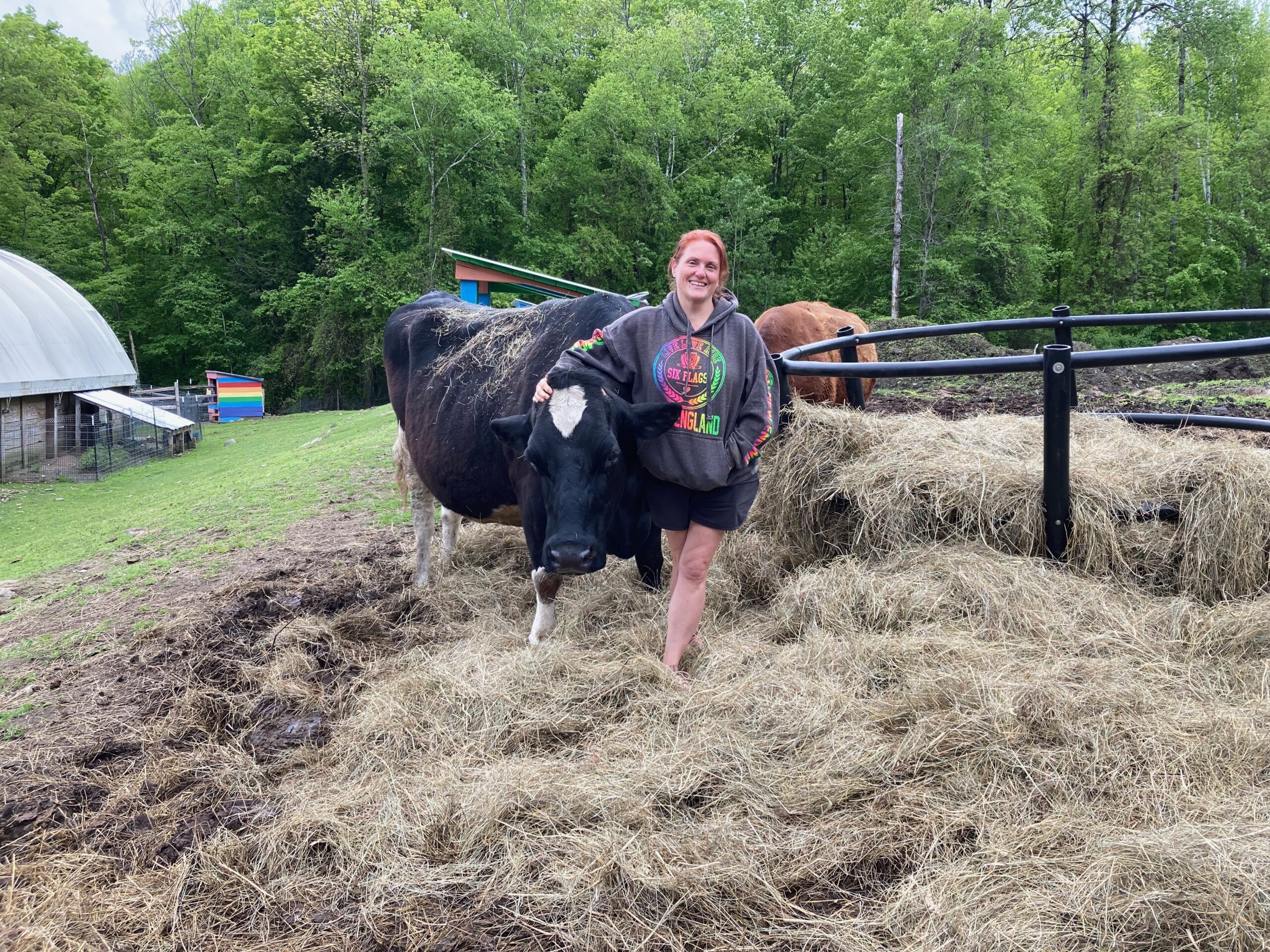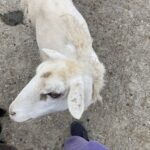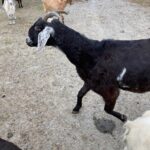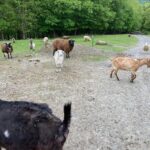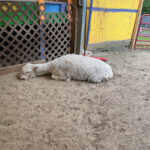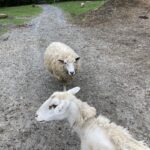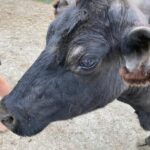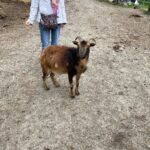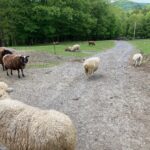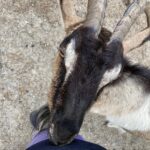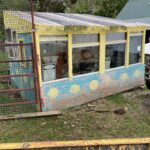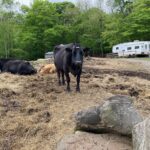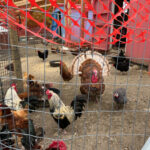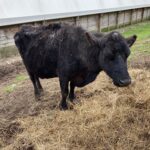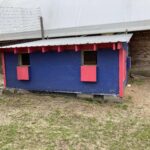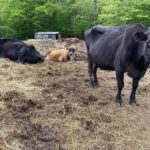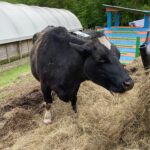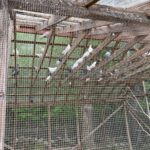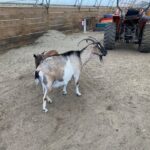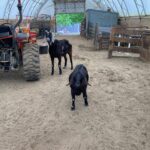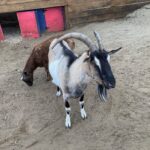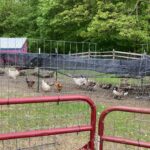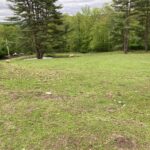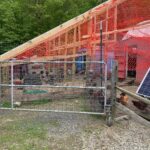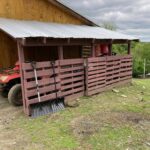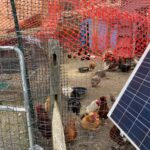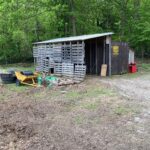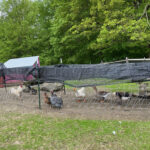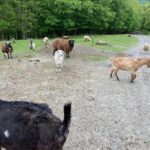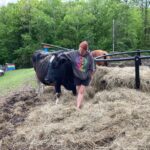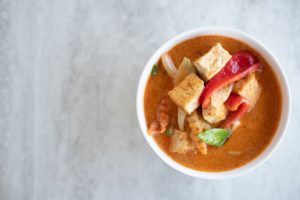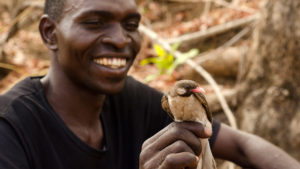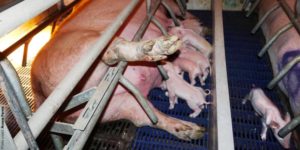How do we define love? Acclaimed author, Kurt Vonnegut, once wrote that “a purpose of human life, no matter who is controlling it, is to love whoever is around to be loved.” American writer, Susan Sontag, an influential voice herself in 20th century literature, expressed that “Nothing is mysterious, no human relation. Except love.” And then there was some hack named “Shakespeare”, who scribbled, “Love looks not with the eyes, but with the mind.” These are all time great thoughts, and applicable to the subject of this post, but they still don’t explain love. In an apparent effort to not sound mushy, Cambridge dictionary limits love to, “liking something very much”, which is simple, but effective. Perhaps actress, Katharine Hepburn, summed it up best when she described love this way: “Love has nothing to do with what you are expecting to get, only with what you are expecting to give, which is everything.” Okay, now we are closer to both a definition, and the type of love that can be felt at VINE Sanctuary, an LGBTQ-led farmed animal refuge. Love can take many forms, but as the old song says, “it’s something that you get, only when you give, and it’s love.” One of my favorite quotes on love belongs to Thich Nhat Hanh, who said, “You must love in such a way that the person you love feels free.” As an animal rights activist, and a “student” of Thich Nhat Hanh, I have humbly tweaked his quote, to read instead, “We must love in such a way that everyone we love feels free.”
I hope Brother Thay approves. 🙂
And on that note, one of the most powerful examples of love that I know of, can be found at VINE Sanctuary.
VINE Sanctuary (VS), is a self described, “LGBTQ-led farmed animal sanctuary that works for social and environmental justice as well as for animal liberation”. Their farm has been in Springfield, VT, for over 15 years, and currently has over 500 beautiful residents, including cows, chickens, ducks, turkeys, sheep, goats, alpacas, and emus. I have had the great pleasure of visiting quite a few animal rescue operations over the years, and in every instance, the people have been inspiring, and completely dedicated to the plight of animals, especially those that have been tortured, and abused in animal factories. VINE Sanctuary is the only one that I have encountered that talks about “intersectionality”, and how animal rights are directly connected to “social and environmental justice”. In fact, they even speak out against the “ongoing genocide in Gaza”, and the “struggle for Palestinian liberation”, on their website. Their site also explains that VINE stands for “Veganism Is Not Enough”, which is a timely reminder to us all to strive for greater moral consistency. As per Martin Luther King, “Injustice anywhere, is a threat to justice everywhere”.
In other words, nothing but love can be found at VINE Sanctuary!
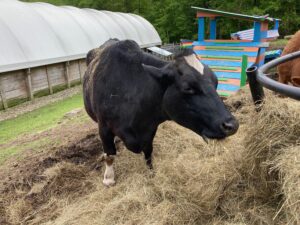
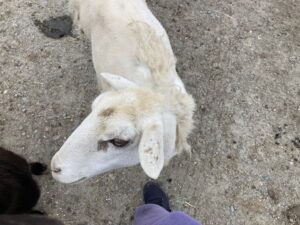
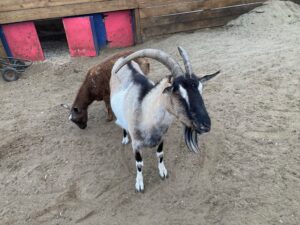 Images: VINE Sanctuary residents
Images: VINE Sanctuary residents
Did you know that over 85 billion land animals endure unspeakable horrors, and are slaughtered each year, in order to support a broken global food system that is based on violence and suffering? Or that it takes 2,500 gallons of water to create 1 pound of beef, and only 30-40 gallons of water to create a pound of potatoes? And that the “single biggest thing” that anyone can do to fight the climate crisis, is adopt a plant-based diet? Did you also know that the United States kills more innocent people than any other country on the planet, and that per capita, it also kills more animals than any other major power as well? Clearly, as VINE Sanctuary points out, loving animals, and going vegan is not enough, but adopting a plant-based diet is still the easiest, and most powerful act that anyone can do to promote peace, and justice, for all beings.
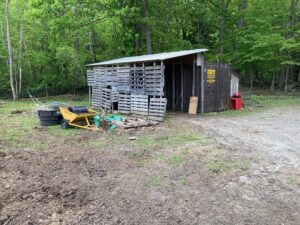
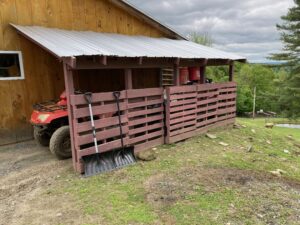 Image: Structures built with shipping pallets
Image: Structures built with shipping pallets
My father grew up on a farm, and was the most talented person I ever met when it came to home repairs, and construction projects. During our visit, I couldn’t help but think of him, and how much he would appreciate the resourcefulness of the work being done at VINE sanctuary. Throughout our walk-around, I noticed multiple sheds on the property that appeared to have been built, at least in part, with shipping pallets (I later learned that they were donated). It was a stark reminder of how expensive it must be to care for over 500 sentient animals in a humane way. All animals are awesome, and the animal “refugees” at VS certainly qualify. Please consider making a donation to VINE Sanctuary if you can. 🙂
Click here for the donation link, and thank you!
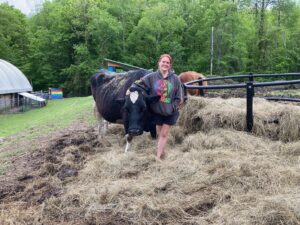 VINE Sanctuary’s Animal Coordinator, Cheryl Wylie
VINE Sanctuary’s Animal Coordinator, Cheryl Wylie
In addition to meeting the animals, one of the great pleasures of our visit was spending time with VS’s Animal Coordinator, Cheryl Wylie. Ms. Wylie was terrific, and knowledgeable, as she explained the workings of the farm, while answering all of our questions. It was clear that her heart, and soul, are with the animals, and the work at VINE Sanctuary. I asked if she would be game for a quick interview, and she agreed with a smile, so long as I emailed her the questions.
Here is our exchange:
1. What is one of your biggest challenges in running an animal sanctuary? Funding, Money?
Cheryl Wylie (CW): “Obviously funding is a big concern for any sanctuary. We have to balance taking in new residents while making sure that we have the resources to care for those already here. The constant requests can be exhausting and it is heartbreaking knowing that we cannot possibly take in everyone in need. The mental toll is a big challenge but without the funds, we can’t do anything.”
2. Most children love animals. When do kids start becoming less compassionate? How do we get kids and adults to care?
CW: “I think that depends a fair amount on their lived experiences. Kids learn what they live. For some that may be compassion towards all species, for others that may be that food comes from the grocery without much mention of the actual source of that food, normalizing the consumption of animal products. The final group are those kids who are taught, usually quite young, exactly where their food comes from. Many of these kids are from more rural areas of the country where this “food chain” mentality almost approaches a religion. It is a type of indoctrination that starts early on and continues for a lifetime. Convincing people to care is a difficult prospect, especially if they weren’t brought up with the empathy to care about others and how their
own actions affect others. All we can do is plant the seed and hope that it grows.”
3. Why should people visit VINE Sanctuary?
CW: “We are a bit different from some of the other sanctuaries in that we are not traditionally open to the public. Many of our residents have come to us from petting zoos or other exploitative places and we never want them to feel like they are someone’s entertainment again. In order to remain in alignment with that value, we don’t do traditional tours here at VINE. Instead, we focus on welcoming visitors to the sanctuary for a day of volunteering. This allows the residents to approach humans on their own terms while giving the visitors a slice of sanctuary life with a minimum amount of disruption. We strive to be a sanctuary to everyone on these grounds, staff, visitors and residents alike and we welcome those who align with that goal.”
4. What do you love most about what you do?
CW: “The residents. Watching them gain confidence and find safety among the other residents is incredible. Many of the residents here have never been able to make any decisions for themselves. We are able to give that back to them, to allow them to decide where to sleep, who to hang around and how much interaction to have with others. They can make friends and form a community that they can enjoy for the rest of their lives. It’s the best part and the reason we do what we do.”
5. When it comes to animal rights, how forgiving are you of people who are willfully ignorant?
CW: “It can be complicated. I grew up on a farm. I started 4-H at the age of 8. At one point I was in 3 separate 4-H clubs, holding offices in 2 and an officer in our local FFA. I knew where the food on the table came from, but the things that are normalized when you are a child stay with you. It is such a strong form of indoctrination so while there may be some that choose to remain ignorant, there are many who know and just can’t overcome those roadblocks in their brain.”
6. What is the biggest lesson that you have learned so far in running a sanctuary? What is the one piece of advice that you would give to others who would like to start an animal sanctuary?
CW: “Expect the unexpected and that includes never underestimating the residents. Whatever you think you need, double it. However much time something is estimated to take, double it (at least.) Half of my time is spent “resident proofing” everything. Goats will figure it out. It doesn’t matter what it is, gates, doors, fences, if they want it badly enough they will find a way. Cows can be destructive and can fit in a fair amount of unexpected places. Ever tried to get a cow out of a chicken coop? I have!”
7. What role does love play in the work that you do?
CW: “I think it goes further than love. It’s a deep commitment to another while knowing that their time is limited by the life expectancy of their species and the consequences of their previous lives. I feel that it isn’t enough to love them, you have to also respect their individuality.
8. I have become more cynical over the years with regards to having faith in our species to love all beings, and our only planet. What are your thoughts on the future of humanity and animals?
CW: “At this point, faith in my fellow humans in general may be at an all time low. I think it’s important to find community now more than ever. It may be the only way to maintain hope going forward but it also is absolutely the only way that we are going to be able to come together to do anything that will make a difference in humanity.”
9. What are VINE Sanctuary’s connections to the LGBTQ community? Is being cool and progressive mostly a Vermont thing? 🙂
CW: “VINE is LQBTQIA founded and led. We have staff and volunteers who are a part of the queer community and we work with various groups for inclusion and equality. Vermont certainly can be cool and progressive but, like most places in this country, we see pockets of conservative ideology. Thankfully, as a state we have managed to keep the welfare of everyone to the forefront.”
10. What is one thing other than animals that you are most passionate about? Why?
CW: “Who has time for anything else?” 😂
11. Have you lost or gained more friends by championing animal rights, and going plant-based (vegan)? What would tell a young person who is afraid of losing the support of family and friends by going vegan, and speaking up for animal rights?
CW: “Admittedly, I am not the most social person. However, I feel like there is something to be said for being around others who have the same deeply held beliefs. People in your life that choose not to be accommodating or not be open minded are xhausting and not great for long term mental health. My family was much more upset that I was vegetarian than when I came out as queer but they have adjusted enough to not be completely irritating when we see one another. I am of the mindset that if friends
and family can’t be supportive, or at least respectful, then maybe you are better off finding a new circle of people.”
12. How many animals do you have at VINE Sanctuary?
CW: “VINE is currently home to around 500 residents including doves, pigeons, chickens, ducks, geese, turkeys, alpacas, cows, sheep goats and emus.”
13. Are all of your animals rescues? Are their stories posted anywhere?
CW: “Everyone here is a refugee from somewhere. Some were from cruelty/neglect situations, some surrendered from their previous families for various reasons and some were found wandering loose. Some of their stories are on our website and many are shared regularly in our newsletters.”
Click here to learn more about the amazing animals at VINE Sanctuary.
14. Do you work with school children?
CW: “We work with kids in a couple of different ways. We have a program called Barnyard Buddies where classrooms “adopt” one of the residents for the year. During that time they get updates about their resident, photos, videos and fun lessons. The second program is Pasture Pals, held on site during the summer. Children learn about things like kindness while meeting residents and helping out with age appropriate chores.”
Click here to learn more about Barnyard Buddies, and Pasture Pals education programs from VINE Sanctuary.
15. Where do you see yourself in 5-10 years?
CW: “I mean why would I go anywhere else? 🙂 I would eventually hope to transition to a slightly less physical position, you can only unload the hundreds of pounds of feed every week for so long!”
Thank you Cheryl Wylie for your kindness, and wisdom, and for all that you do! 🙂
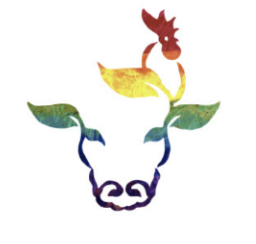 The VINE Sanctuary website has many pages full of valuable resources, and information.
The VINE Sanctuary website has many pages full of valuable resources, and information.
Here are excerpts from a few of my favorites:
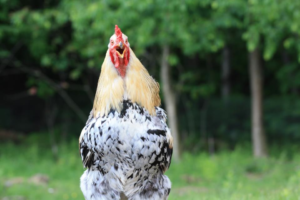 Image: VINE Sanctuary
Image: VINE Sanctuary
Roosters at VINE
VINE Sanctuary Website (WS): “We were the first to rehabilitate roosters rescued from cockfighting, and our methods are now used by sanctuaries around the world. It all began in early 2000, when founders Pattrice Jones and Miriam Jones found an escapee from the poultry industry in a roadside ditch. They brought the hen home and incorporated her into their family. And then she began to crow! Renamed Viktor Frankl, that first rooster became a co-founder of what is now VINE Sanctuary. From Viktor, who tenderly parented the next two birds to arrive and then became best friends with another adult rooster, we learned not to believe the stereotypes about roosters. Other roosters who taught us important lessons that first year included Chickweed (who loved his sister Violet), Che (who sang lullabies to anxious youngsters), and Turtle (who served as the guide of a blind hen).”
Click here to learn more about the roosters at VINE.
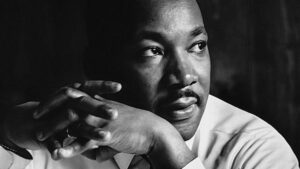 Image: Dr. Martin Luther King, Jr.
Image: Dr. Martin Luther King, Jr.
Martin Luther King Day Vegan Challenge:
VINE Sanctuary WS: “Every year, VINE Sanctuary encourages vegan and animal rights activists to honor Martin Luther King Jr. Day by spending time learning about past and ongoing antiracist struggles. This year, in recognition of the ongoing genocide in Gaza, we are recommending readings and videos that focus on MLK’s opposition to war and colonization, as well as the long-standing linkages between the antiracist movement in the USA, and the struggle for Palestinian liberation.
Click here to learn more about the MLK Vegan Challenge.
Click here to learn more about Dr. King from Plant Based Diets Rock!
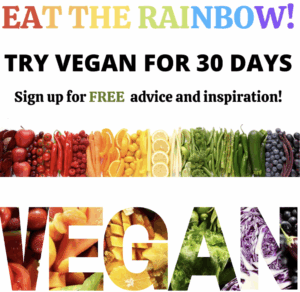 Image: Rainbowvegan.org
Image: Rainbowvegan.org
PRIDE Month Vegan Challenge:
VINE Sanctuary WS: “The Pride Month Vegan Challenge dares YOU to “Eat the Rainbow” for a month by going vegan for 30 days. You’ll get daily advice and inspiration and can be matched with a vegan mentor if you choose. Over the course of the month, you’ll meet amazing vegan activists from all walks of life, and you’ll receive a new “rainbow recipe” every day! The Pride Month Vegan Challenge is a project of VINE Sanctuary. VINE is an LGBTQ-led farmed animal sanctuary that works for social and environmental justice as well as for animal liberation. We sponsor this challenge because we know how much truer to ourselves we all felt after going vegan. We want you to experience the joys of veganism too! We can be healthy and happy without hurting cows, birds, or other amazing animals…Going vegan can also be a way to be more true to yourself and your values. Visit the Intersections page of our website to learn about some of the linkages we see between animal liberation and struggles for social justice, including the LGBTQ+ movement. As all out and proud LGBTQ+ people know, being true to your own heart’s desires is much more important than conforming to social norms about what you are supposed to want. Probably, you don’t really want to kill animals or be responsible for their suffering in any way. Probably, you do want to be in better relationships with animals and the wide, wild, wondrous larger-than-human world. Try vegan for a month to experience the wonderful feeling of deliberately choosing to be kind to animals every day!”
Click here to sign up for the PRIDE Month Vegan Challenge.
Instead of Eggs:
VINE Sanctuary WS: “With the price of eggs reaching record highs, many people are looking for cheaper options to use in cooking. The good news is that many egg replacements are not only cheaper but also work better in many recipes. You can use simple ingredients like mashed bananas, applesauce, or baking powder to do anything that eggs can do! These alternatives are easy to find and work well in many dishes—from baked sweets like muffins and pancakes to savory dishes like scrambles and loaves. Beyond saving money, there are other good reasons to use egg alternatives. Most eggs come from factory farms where miserable hens are crowded together in tiny cages. Even on “free range” farms, hens suffer. Egg farming harms the environment by polluting water and wasting resources. As for health, eggs contain high amounts of cholesterol, which may increase the risk of heart problems. By choosing egg alternatives, we can help animals, protect the environment, and take better care of our health.”
Click here to learn more about why we should eat egg alternatives.
Click here to learn more from nutritionfacts.org.
The bottom line? VINE Sanctuary inspires through their game-changing, and life-saving work. I will be adding their wonderful resources to my classroom discussions whenever possible. Thank you again Cheryl, and everyone at VINE Sanctuary!
We hope to see you again soon. 🙂
Until next time…
FREE PALESTINE!
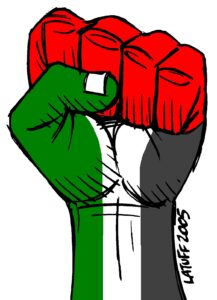 Artist: Carlos Latuff
Artist: Carlos Latuff
Additional Sources:
Click here to learn more about Barnyard Buddies, and Pasture Pals education programs from VINE Sanctuary.
Click here to learn more about Humane Education.
Click here to learn more about the National Association for the Education of Young Children core goals of anti-bias education.
Click here to make a donation to VINE Sanctuary.
Click here for the VINE Sanctuary Swag Store page.
Click here to learn more about visiting, and volunteering with VINE Sanctuary.
Click here to sign up for the VINE Sanctuary Newsletter.
Click here to learn more from the always excellent, Maria Popova, on the meaning of love.
Click here to learn more about Thich Nhat Hanh.

